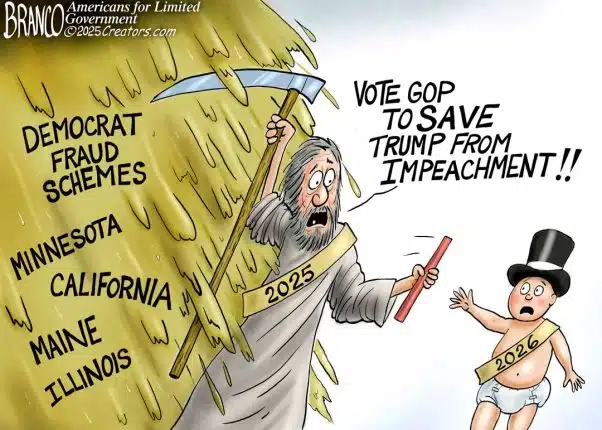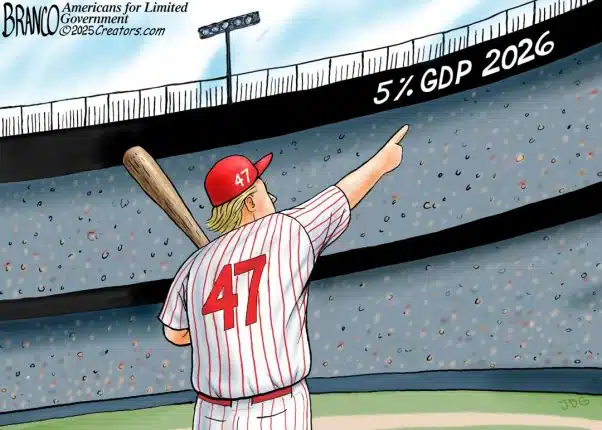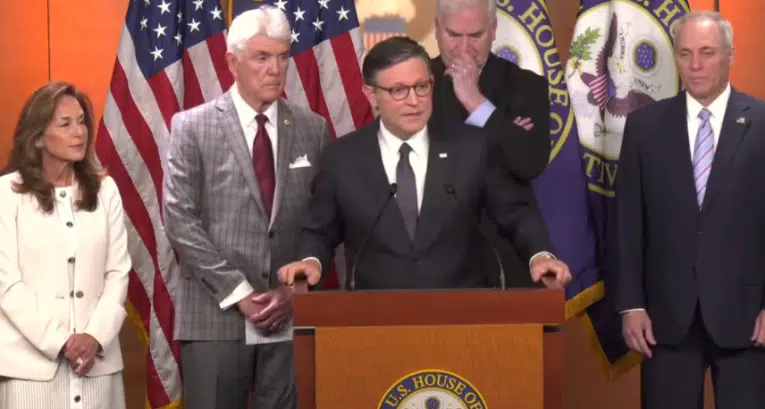By Bill Wilson –
Starting today, Congress will begin the process of enacting the deal negotiated between the White House and the Republican Senate. It has been much more difficult than many had imagined to come to a clear cut position on this measure. As I and others have stated over the last several days, the country is on the horns of a dilemma.
If the deal goes through, with the automatic tax increases blocked for two years along with a host of tax “extenders”, social spending and so-called “green” subsidies, the nation is likely to avoid a double-dip recession. But the price is we will be adding nearly $1 trillion in more debt to the U.S. balance sheets because the deal will not address Washington’s out-of-control spending.
If, on the other hand, the deal is rejected, taxes will soar, we will almost certainly get that dreaded double-dip and the budget deficit is likely to explode with added social expenditures.
Neither prospect is appealing. The $120 billion payroll tax reduction is nothing more than Stimulus IV but by another name. Little can be expected from it except adding to the $13.8 trillion debt.
While the outcome is in doubt, the odds favor the establishment. Their fear of another downturn in the economy has greater sway over the politicians than the legitimate fear of opponents — real or feigned — of the growth in the national debt. This is yet another example of the American prejudice for immediate gratification.
But the debt must be addressed. An article in December 11th London Telegraph hit the nail on the head. It notes surging interest rates on U.S. government debt coming because Washington simply cannot rein itself in. “[T]he market is increasingly alarmed at the rate of increase of the U.S. government’s already massive liabilities,” writes Liam Halligan, adding, “America’s government debt is set to expand by a jaw-dropping 42 percent over the next few years, reaching $19.6 trillion by 2015 according to Treasury Department estimates presented (amid very little fanfare) to Congress back in June. Since then, government spending has risen even more. So U.S. debt service costs, like those of many other Western nations, are expanding rapidly in terms of both the volumes of sovereign instruments outstanding, and the yields on each bond.”
That’s awful news, and means that if spending is not brought under control in Washington, little else will matter. Rising interest payments on the national debt run the risk of cancelling out increased growth from keep tax rates steady.
In FY 2010, the $228 billion in interest payments was $19 billion more than the Congressional Budget Office (CBO) said it would be in March for 2010. Back then they said it would be $209 billion. So, interest owed on the national debt is already rising well above expectations, 9 percent more in 2010 alone.
The quicker those payments rise, the more likely those payments are to come into the 18 to 20 percent of revenue range Moody’s has warned the nation against, resulting in a credit downgrade. Under CBO’s previous projections, that downgrade would be in 2018. But, if CBO was off by 9 percent for each of those ten years, fiscal doomsday moves up to 2017, when interest payments would be $735 billion instead of $675 billion versus a projected $3.869 trillion in revenue.
If CBO is wrong about revenue, too, the situation looks even worse. Its assumptions are based on the current tax rates expiring, and there being no recessions between now and then. But if growing fears about the debt overwhelm the markets, even if the tax rates are extended, we will not be able to grow out of this mess.
So, when all is said and done, what happens with the tax vote will be of momentary importance. The debt is killing us. The new, Republican-dominated Congress in January will have only one big choice to make. Either they will continue the head-in-the-sand policies, pretending to cut the budget by merely slowing the growth of spending; or, they can act decisively to reverse course by addressing the dire debt situation head-on.
What would that mean? A meaningful set of actions would start with putting all spending levels in the next budget at 2007 positions totaling $2.7 trillion instead of the current $3.5 trillion, about $800 billion of savings. And then they would have to cut from there. Only reductions to these levels can hope to stem the tide of red ink.
Unfortunately, it will be difficult to get tough on budget cuts. The weak-sisters and quislings are already shedding crocodile tears about being “too tough” on spending. They bring up revisionist stories of the 1995 so-called “shut-down” and warn that the GOP will lose badly in the elections if they take a stand now.
But what is obvious is that anything less than aggressive reductions in government spending, and the corresponding eliminations of government power over the lives of citizens and business, will be viewed as weakness and cowardice in the face of the greatest threat America has faced in more than a generation.
So, the vote on the tax bill is important and will have consequences on the lives of millions of Americans. But it is but a diversion compared to the work that must begin on January 3rd to drastically reduce spending below current levels. That’s where the real action is regardless of the outcome of the vote on the “tax deal.”
Bill Wilson is the President of Americans for Limited Government.






